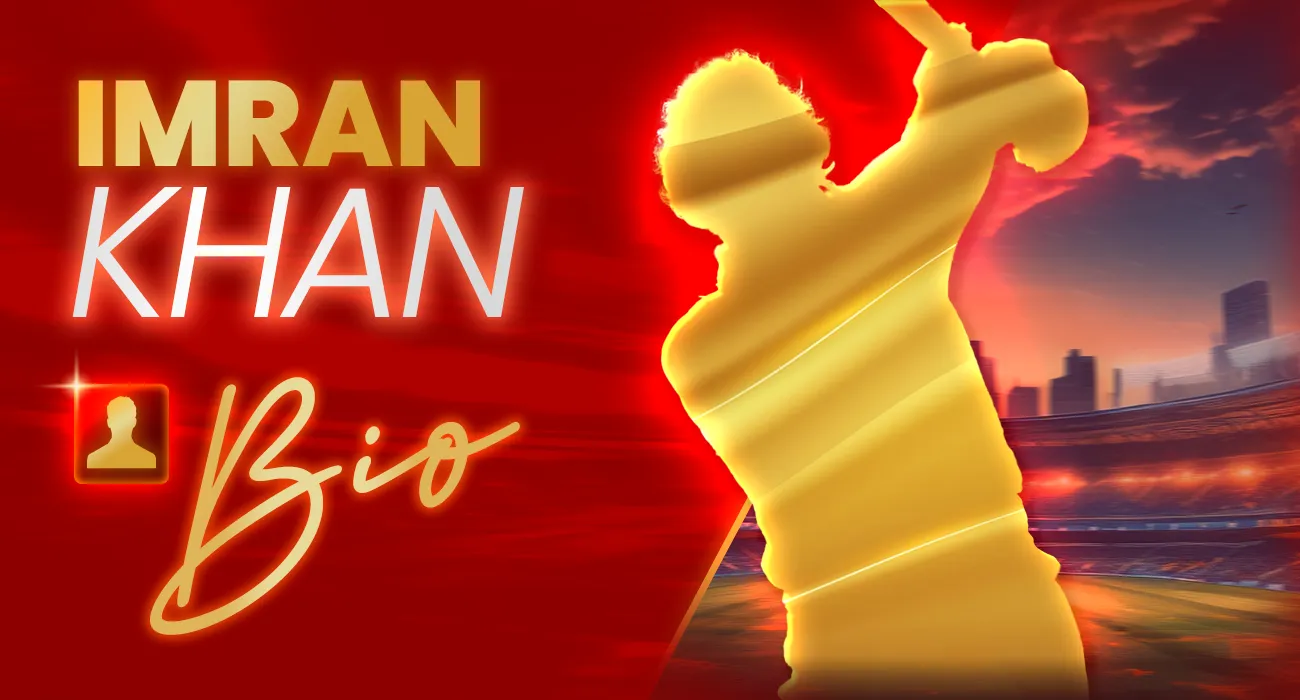Imran Khan, a legendary Pakistan cricketer and historic leader, is often referred to as the best all-rounder in the history of cricket. He led Pakistan to its first-ever Cricket World Cup victory in 1992, inspiring admiration and respect for his leadership and skill, and will definitely not be forgotten.
After retiring as a cricketer, Khan became famous for his very likable personality and voice, as well as his dancing skills, while also (drastically) reinventing himself as a political leader (by forming the ‘Pakistan Tehrik-e-Insaf’ party) and later becoming Pakistan’s Prime Minister (2018 -2022). Khan is synonymous with perseverance and grit, and represents nationalism.
One of the most well-known personalities in cricket and other fields is Imran Khan. Imran’s legacy is rich, complex, and motivational. He was admired for his remarkable all-around abilities on the cricket pitch and later as a charismatic political leader.
One of the greatest cricket leaders in history, he captained Pakistan to its first-ever Cricket World Cup triumph in 1992. He left the sport to pursue a career in politics and philanthropy before rising to the position of 22nd Prime Minister of Pakistan. This blog examines Imran Khan’s life, career in cricket, personal life, and lasting influence.
Biography of Imran Khan
- Real Name: Imran Ahmad Khan Niazi
- Full Name: Imran Ahmad Khan Niazi
- Nickname: Skipper, Kaptaan
- Profession: Cricketer, Politician, Philanthropist
- Famous for: Leading Pakistan to victory in the 1992 Cricket World Cup
- Best Performance: 6/14 against India in 1985; 72 runs and one wicket in the 1992 World Cup Final
- Salary (as PM): Approx. PKR 2 lakh per month (as per public record)
- Monthly Income (Post-Cricket): Varied via politics, speeches, and foundations
- Website URL: https://www.insaf.pk (Pakistan Tehreek-e-Insaf – Political Party)
- Instagram Handle: @imrankhan.pti
Physical Status
- Height: 6 feet 2 inches (1.88 m)
- Weight: Approx. 80 kg
- Body Measurements: Athletic build
- Eye Colour: Hazel Brown
- Hair Colour: Black (later grey)
Personal Life
- Date of Birth: October 5, 1952
- Place Of Birth: Lahore, Punjab, Pakistan
- Nationality: Pakistani
- Hometown: Mianwali, Punjab
- School: Aitchison College, Lahore
- College: Keble College, University of Oxford
- Highest Education Qualification: BA in Philosophy, Politics, and Economics (PPE)
Family Statistics
- Marital Status: Divorced (three marriages)
- Wife: Jemima Goldsmith (1995–2004) & Reham Khan (2015–2015)
- Bushra Bibi (2018–present; separated)
- Children: 2 sons (Sulaiman and Qasim) with Jemima
- Parents: Ikramullah Khan Niazi (father), Shaukat Khanum (mother)
- Siblings: Four sisters
- Religion: Islam
- Other Hobbies: Reading, writing, philanthropy, fitness, spiritual learning
Early Life of Imran Khan:
Imran Khan was born on October 5, 1952, in a flourishing family in Lahore, Pakistan. His athleticism, confidence, and leadership skills were out of this world even when he was young. Having been born into a conservative yet progressive family and getting an exclusive liberal education, both ideologies were made available to Imran. His cricket skills first became apparent while he was a student at Lahore’s esteemed Aitchison College. He later relocated to Worcester, England, to attend the Royal Grammar School, where he improved his cricketing abilities.
He was accepted to Oxford University to study Philosophy, Politics, and Economics (PPE) at Keble College as a result of his skills. He was known within the English cricketing fraternity, and he also learnt a lot of leadership skills when he captained the University of Oxford cricket team. These early years formed the basis of a legendary international cricket career that was outstanding in skills and inspirational leadership.
Education of Imran Khan:
In 1975, at the end of his Oxford degree at Keble College, Imran Khan read Philosophy, Politics and Economics (PPE). It was in Oxford that he stayed, which greatly shaped his career both as a cricketer and his intellect and personal opinions. The multidisciplinary nature of the PPE program led to his critical thinking skills, proficiency in communication, and an in-depth understanding of social and political processes. These qualities would later work in his favor when he transitioned to politics after being a sportsman.
Education and self-growth were important to Imran as he tried to balance academia and sport despite the fact that his love was the field of cricket. His university experience influenced his leadership and expressive personality a lot, as well as his confidence. His stay in England had exposed him to numerous cultures and thoughts, and this had broadened him and prepared the platform that would propel him to become one of the most prominent leaders and agents of change in Pakistan.
Imran Khan: Cricket Journey
Journey in the IPL and Domestic
Since the Indian Premier League (IPL) was founded in 2008, long after Imran Khan had retired from international cricket, he has never participated in it. He did, however, have a notable domestic cricket career, playing for Sussex in the English county circuit, Lahore, and Pakistan International Airlines (PIA). His stint with Sussex was particularly beneficial as it allowed him to improve his swing bowling and adjust to various playing situations.
Imran was able to improve his technical accuracy, tactical awareness, and discipline by playing English county cricket. He became one of the most feared fast bowlers on the international scene as a result of his exceptional achievements. Imran played a significant part in forming the next generation of Pakistani cricket players by using his skills and knowledge to coach up-and-coming players.
International Career
At the age of 18, Imran Khan made his Pakistani debut in 1971. Although his early performances were promising, he really developed into one of the world’s best fast-bowling all-rounders in the late 1970s and early 1980s. Imran was Pakistan’s game-winning batsman, renowned for his ferocious pace, mastery of the reverse swing, and graceful batting style.
He led the national side to its biggest victory in the 1992 Cricket World Cup while serving as captain from 1982 to 1992. Imran developed players like Wasim Akram, Waqar Younis, and Inzamam-ul-Haq, and under his direction, Pakistan emerged as a formidable force in international cricket.
Injuries and Comebacks
Imran Khan sustained multiple injuries during his cricket career, mostly as a result of the physical demands of fast bowling. He developed persistent problems with his back and shins as a result of his strenuous pace and extended periods of exertion. A stress fracture in his shin, which may have ended his career as a fast bowler, was one of his most severe setbacks in the early 1980s. However, Imran underwent a rigorous rehabilitation process thanks to his perseverance and dedication to fitness, which enabled him to return to international cricket successfully.
His fortitude and capacity to recover were renowned. In 1987 and 1992, he made incredible returns, delaying his retirement to captain Pakistan in the Cricket World Cup. That choice turned out to be momentous because Pakistan won its first World Cup under his direction. His legacy as a genuine champion and national hero was solidified in 1992 by his recovery, leadership, and performance.
Personal Life of Imran Khan:
Outside of cricket, Imran Khan led a well-known and frequently questioned public life. His 1995 marriage to British heiress Jemima Goldsmith, which represented a blending of Eastern and Western traditions, garnered a lot of media attention. Imran established Pakistan’s first charitable cancer hospital, the Shaukat Khanum Memorial Cancer Hospital in Lahore, after his mother passed away from cancer. His reputation was greatly enhanced by this historic accomplishment in healthcare, which also demonstrated his dedication to social welfare.
In 1996, Imran entered politics and founded Pakistan Tehreek-e-Insaf (PTI), building on his reputation as a philanthropist. He endured years of criticism, tenacity, and difficulty throughout his political career. He gradually developed a sizable grassroots following in spite of obstacles. Following over twenty years of tenacity, the PTI won the general elections in 2018, and Imran Khan was appointed Pakistan’s prime minister. In Pakistan’s history, his transformation from cricket star to political leader is still regarded as one of the most amazing.
Career Statistics of Imran Khan:
Test Debut:
The Test debut of a player is the first time they are involved in international cricket in the form of Test cricket, which is the oldest and longest format of the game. This significant achievement shows that they are resilient, resourceful, and tough mentally. It is a five-day system, which is said to be the ultimate test of the capability of a cricket player. The date, the opposition, and the venue of the Test debut are recorded, and it often turns out to be a very special affair, especially when the player has made an impressive match debut.
ODI Debut:
The initial 50-over limited form of playing international cricket belongs to a player and is referred to as their One Day International (ODI) debut. They are making their debut in the white-ball cricket strategy and a fast-paced environment. Since ODIs demand brisk scoring, precise catching, and pitching, it is an indication of the talent and all-around ability of the player. Records typically consist of the venue, the second team, and the date of debut. A good ODI debut also helps a cricket player not only to improve his reputation but also to open the door to such great competitions as the ICC Cricket World Cup.
T20 Debut:
The first time that a cricket player appears in a Twenty20 International, the form of the game with only 20 overs per team, it is said that he made his T20 debut. T20, being famous due to its high-paced game and entertainment level, also requires aggressive batting, eccentric bowling, and quick fielding. With the format being popular, the debut of a player in T20 is a phenomenon that puts the player under the lens of the media all over the world and often garners significant interest. One of the debut information includes the rival, venue, and date of the match. It is also an introduction of the player to a type of format in which the performance is often instant and meaningful.
IPL Debut:
A cricket player’s maiden appearance in the most lucrative and well-known domestic T20 competition in the world is known as their Indian Premier League (IPL) debut. Their brilliance is displayed on a huge stage with international celebrities in this premiere. Through their IPL performances, players receive a great deal of publicity, sponsorship opportunities, and fan support. The team name, date, opponent, and location are all part of an IPL debut. An outstanding IPL debut can help many rookie cricket players get selected for the national squad more quickly, while for international players, it strengthens their position in the T20 league.
Achievements of Imran Khan:
- 1992 Cricket World Cup Winner (Captain)
- ICC Cricket Hall of Fame Inductee (2010)
- One of the Greatest All-Rounders in Cricket History
- Wisden Cricketer of the Year (1983)
- 23 Five-Wicket Hauls in Tests
- First Pakistani to 300 Test wickets
- Shaukat Khanum Cancer Hospital Founder (1994)
- Built Namal University (Mianwali)
- 22nd Prime Minister of Pakistan (2018–2022)
- Oxford University Graduate – One of the Few Cricketer-Politicians with Elite Education
Here are Some of the Lesser-Known Facts About Imran Khan:
- He invented the reverse swing and bowled equally well with fresh and old balls.
- Imran honed his bowling technique while playing county cricket for Sussex in England.
- In order to prevent a conflict of interest, he declined the PCB’s standard cricketer’s pension.
- Proficient in Pashto, Urdu, and English.
- His autobiography, “Pakistan: A Personal History,” was written by him.
- Declined numerous offers to coach and commentate internationally after retiring.
- Trained Waqar Younis and Wasim Akram, two future cricket stars.
- Was chosen as the most well-known Pakistani in a worldwide BBC survey (2002).
- Renowned for his later-life spiritual awakening brought on by Sufism.
- The Shaukat Khanum Hospital offers free cancer treatment and is fully funded by donations.
Imran Khan’s story is that of a unique person who excelled in both politics and sports, two completely different fields. He continues to be a representation of unparalleled skill, leadership, and tenacity on the cricket pitch. Off the pitch, he used his notoriety to make a significant difference through public service and philanthropy.
Imran Khan’s life narrative is a monument to bravery, foresight, and unwavering dedication—from winning the World Cup to occupying Pakistan’s top political position. Millions of people worldwide are still motivated by Imran Khan’s legacy, whether they view him as a leader, humanitarian, or cricket player.
Also read: Field Hockey – What Gear You Need for a Safe Game 2025






